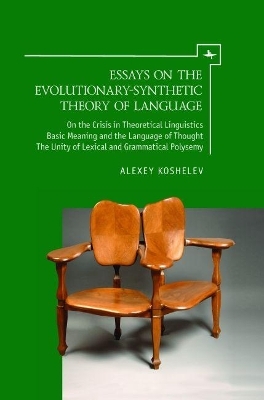
Essays on the Evolutionary-Synthetic Theory of Language
Academic Studies Press (Verlag)
978-1-64469-606-4 (ISBN)
This book implements a multidisciplinary approach in describing language both in its ontogenetic development and in its close interrelationship with other human subsystems such as thought, memory, and activity, with a focus on the semantic component of the evolutionary-synthetic theory.The volume analyzes, among others, the mechanisms for grammatical polysemy, and brings to light the structural unity of artefact and natural concepts (such as CHAIR, ROAD, LAKE, RIVER, TREE). Additionally, object and motor concepts are defined in terms of the language of thought, and their representation in neurobiological memory codes is discussed; finally, the hierarchic structure of basic meanings of concrete nouns is shown to arise as a result of their step-by-step development in ontogeny.
Alexey Koshelev is the author of two books, Cognitive Analysis of Universal Human Concepts (Moscow, 2015) and Essays on the Evolutionary-Synthetic Theory of Language (Moscow, 2017), and over fifty papers on cognitive semantics, theoretical linguistics, lexical and grammatical polysemy, history of linguistic theories, general theory of development and related subjects.
Acknowledgements
Preface
1. The place of the evolutionary-synthetic theory of language among the ranks of linguistic theories
2. Peer reviews of the evolutionary-synthetic theory
3. About the book contents
Chapter 1
On the contradictory nature of contemporary linguistic theories and how to change it for the better
1. Introduction
2. A compendium of incompatible linguistic frameworks
3. Contrastive analysis of some mutually contradicting linguistic theories
1. Introduction
2. On the role of language in thought
3. Is language an autonomous module ("cognitive organ")?
4. Other opposing assumptions in the theories under discussion
4. Contradictory descriptions of particular linguistic problems
1. The incompatibility of theories of lexical polysemy
2. Contradictory descriptions of the syntax-lexicon interface
3. Theories of language origin and evolution
5. The futility of attempts to reach a consensus
1. Unproductiveness of scholarly polemics
2. Inefficiency of interdisciplinary approaches
6. Is linguistics a natural science?
7. The crisis and its causes
1. Is "multiparadigmality" typical of linguistics?
2. The status of linguistics as a science
3. The root of trouble
8. Principles of an evolutionary-synthetic theory of language
9. Crisis in the cognitive sciences
1. Contradictory frameworks in cognitive sciences
2. The cause of the crisis
3. Towards a unified cognitive paradigm
Chapter 2
A reference-based approach to describing notional words
1. A reference-based approach to lexical semantics
1. The dual structure of lexical meaning
2. Basic meanings of the words chair and armchair
2. An analysis of basic meanings of the action verbs udarit' 'hit-PF', tolknut' 'push-PF', padat' 'fall-IMP', brat' 'take-IMP' and vzbirat'sja 'climb-IMP'
1. Introductory remarks
2. Contact verbs: udarit' 'hit-PF', kosnut'sja 'touch-PF', tolknut' 'push-PF'
3. The verb padat' 'fall-IMP'
4. The verb brat' 'take-IMP' / vzjat' 'take-PF'
5. The verb vzbirat'sja 'climb'
3. Verbs of spatial orientation:... stojat' 'stand', sidet' 'sit', ležat' 'lie', and viset' 'hang'
1. The verb viset' 'hang'
2. The verbs stojat' stand', ležat' 'lie', and sidet' 'sit'
4. The motion verbs...idti 'walk', bežat' 'run', polzti 'crawl', šagat' 'step/stride', prygat' 'jump', and exat' 'go/ride/drive'
1. The motion verbs idti 'walk' and bežat' 'run'
2. A comparative description of the verbs idti 'walk', bežat' 'run', polzti 'crawl', prygat' 'jump' and šagat' 'step/stride'
3. Basic meaning of the verb exat' 'go/ride/drive'
5. The structure of lexical polysemy
1. Reference in lexicology
2. Lexical polysemy
3. Supplement. Three contemporary approaches to lexical polysemy
6. Appendix 1. Excerpts from the email correspondence between A. D. Koshelev and I. A. Mel'čuk (February—March 1995)
7. Appendix 2. An infant's early acquisition of the laws of nature
1. An infant's view of the physical world
2. Formation of causal relationships
Chapter 3
Basic-level concepts as the neurobiological codes for memory
1. Concrete concepts and motor concepts
1. Introduction. Two interpretations of basic-level concrete concepts
2. Functional schema of basic-level concepts
3. The function of an object and a linguistic explanation of this function
4. A linguistic explanation of the concept functional schema
5. Neurobiological grounds for the basic concept schema
6. Motor concepts
7. Concrete concepts TropInKA 'FooTpATh', DorožKA 'TrAcK', dOROgA 'ROAd'
8. Concepts OzERO 'LAkE' and REkA 'RIVER'
9. The concept dEREVO 'TREE'
10. Appendix. On the dual nature of human categories
2. On the psychophysical state and the neurobiology of human actions
1. Events and their storage in memory (the neural codes of memory)
2. Psychophysical state as a memory code for interaction
3. Biomechanical models of walking and running
4. On recognition of observed actions
5. Mirror neurons and action recognition
6. Canonical neurons and object recognition
Chapter 4
Elements of a sensory grammar
1. On the basic and derivative meanings of ... nominal genitive constructions in Russian (ručka dveri handle-Nom door-gen, vetka dereva branch-Nom tree-gen)
1. The 'part-whole' relationship and its linguistic representation
2. Objects and their functional parts
3. The basic meaning of the nominal genitive construction Y X-gen
4. The derivative meanings of the nominal genitive
5. Objects with a multilevel partitive structure
6. The partitive structure of plants
7. The partitive structure of animals and humans
2. On structural and genetic similarity of lexical and grammatical categories. …The meaning of transitivity
1. The structure of basic meaning
2. The structure of polysemy
3. The meaning of transitivity
3. The basic and derivative meanings of voice.
The active, passive, and reflexive meanings
1. A cognitive approach to the analysis of voice meanings
2. The active voice
3. The reflexive voice: myt'sja ʻwash-reflʼ, kutat'sja ʻmuffle-refl up [in something]ʼ, brit'sja ʻshave-reflʼ
4. The passive voice: mašina moetsja ʻthe car is washing-reflʼ, bel'ё sušitsja ʻthe linen is drying-reflʼ, dom stroitsja plotnikom ʻthe house is building-refl by the carpenterʼ
Chapter 5
On the single structure of lexical meanings of nouns and verbs
1. Object and the system of its parts (the partitive concept)
1. Object and its parts
2. The function of an object as the sum of the functions of its parts
3. The role-based hierarchy of object parts
4. The developed concept
5. How is the main part of an object determined?
6. The functional and physical parts of an object
7. On the radial position of the parts of an object
8. A developed concept represented as a circle
9. The recursiveness of a partitive concept
10. A vocabulary of elementary cognitive units
11. On distinguishing physically connected objects
2. An object and the system of its properties (the attributive concept).
The basic meaning of a concrete noun
1. An object and its properties
2. Conceptualization of concrete properties
3. The partitive-attributive extension of a concrete concept and the basic meaning of a concrete noun
3. A motor concept and its two extensions: partitive and attributive. The basic meaning of an action verb
1. The motor concept SxVATIT' 'gRASP' (seize an object by the hand)
2. The action bežAT' 'RUN'
3. The attributive motor concept
4. The basic meaning of action verbs
References
Index
| Erscheinungsdatum | 12.04.2021 |
|---|---|
| Übersetzer | Alexander Kravchenko, Jillian Smith |
| Zusatzinfo | Illustrations, unspecified |
| Verlagsort | Brighton |
| Sprache | englisch |
| Maße | 152 x 228 mm |
| Themenwelt | Geisteswissenschaften ► Sprach- / Literaturwissenschaft ► Sprachwissenschaft |
| ISBN-10 | 1-64469-606-1 / 1644696061 |
| ISBN-13 | 978-1-64469-606-4 / 9781644696064 |
| Zustand | Neuware |
| Haben Sie eine Frage zum Produkt? |
aus dem Bereich


